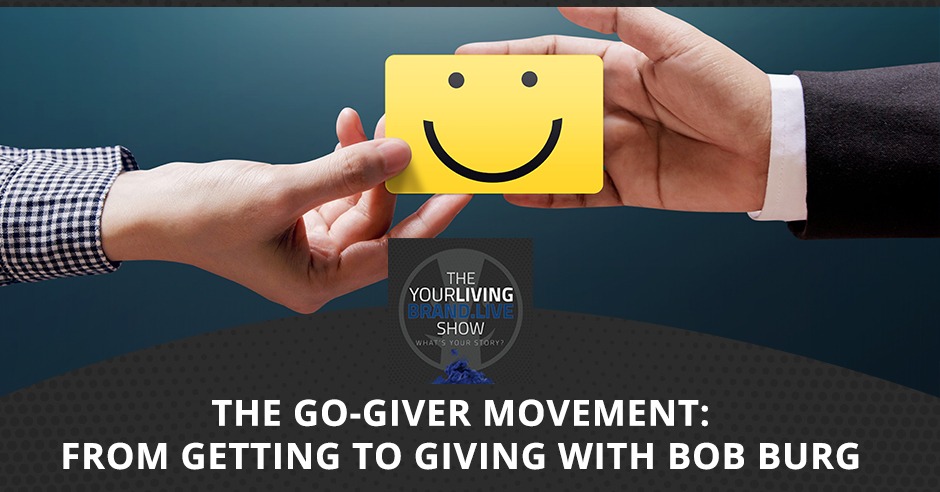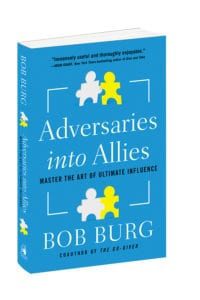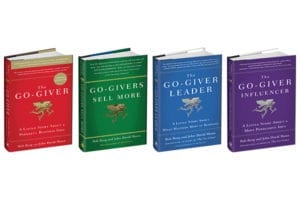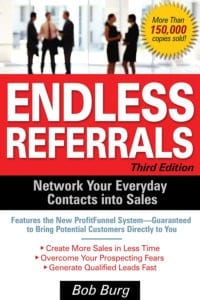
Living a life of significance entails leading better and becoming influential. Today, Ben Baker interviews the Hall of Fame keynote speaker and bestselling co-author of The Go-Giver and The Go-Giver book series, Bob Burg. Shifting your focus from getting to giving is what he teaches the world. Bob unpacks his Go Giver Movement and shows us its component and what you can do to be a part of it. He also breaks down his five concepts of authenticity and explains the Law of Value. Learn how to have success in Bob Burg’s terms by simply listening to this episode or joining his movement.
—
Listen to the podcast here:
The Go-Giver Movement: From Getting To Giving With Bob Burg
Thank you for being my wonderful audience. Every single week, I hear from you. Every single week, I get amazing emails from everybody that tells me what they like, what they want to hear, the things that they’ve learned. I love having such an amazing audience that gives me the insight of where it should be going next because I can’t do this show without you so keep the letters coming. Keep the emails coming to Ben@YourBrandMarketing.com. Connect with me on LinkedIn at Your Brand Marketing and thanks for being part of the audience. We have a special guest. He is a Hall of Fame keynote speaker and bestselling co-author of The Go-Giver and The Go-Giver book series. Welcome to the show, Bob Burg.
Ben, it’s great to be with you.
It’s great to have you on the show. I’ve been vicariously aware of The Go-Giver Movement for years. It’s something that people have whispered in my ear. I’ve read things about it. I’ve seen things about it, but I haven’t been intimately attached to it. The more I realize is all the people that I’ve been influenced by, all the people that have given me the best advice over the years got it from your thought process. It’s all about adding value. It’s all about giving people something of value and building trust long before you ask for the sale, long before you ask for anything. Your job as a human being is to give value. I want to go through this with you. I want to unpack the whole Go-Giver Movement. Where did it come from? Where are you now? Let’s talk about where you’re going. Let’s get into this.
By and large, I was brought up by two people who I would consider the go givers. That’s not necessarily a term that would have been used, but these are people who always brought value to the lives of others. They always focused on bringing value to others and whatever way value would be measured. I had that foundation. John David Mann, my awesome co-author and the lead writer and storyteller, grew up in a similar family background, a lot of love. That’s a great advantage to have parents who are like that. As I got older and got into the business world, you experience people who do things in a contrary way to that, growing up you do but not outside your family but in the business world certainly. Sometimes you see people who succeed when they’re not the type of people you’ve grown up to want to emulate. You wonder why that happens. I know with me and I started to think maybe that’s what I needed to do. Maybe I needed to be that type of person.
What I was fortunate to learn quickly is that people who are either nasty people or unhelpful people, we would call go-takers. When they’re successful financially and at times they are, it’s a big world. There are lots of ways to accomplish things, but typically they’re not successful because of that. They’re successful despite that. That’s important for people to know. It was good when I learned that and went back to doing things the way that I was brought up doing. It’s also a matter of understanding and learning success principles along the way. Some people mistakenly think that when we talk about being a go-giver, we’re talking about being a nice person and being nice is certainly a fantastic thing. It’s a wonderful thing, nice and kind. The two aren’t necessarily the same but using them interchangeably. It’s a great way to be both for its own sake, but also it’s a lot more helpful in being successful when you are a nice or a kind person because you’ve got people on your side, people who want you to succeed and people who will be there for you.
It's a matter of doing things in the correct way that allows a person to be successful and finish first. Share on XNonetheless, that’s not enough in and of itself. We all know people who we would describe as being nice people, who we would also have described as being broke people. It’s a matter of being nice or being kind. It’s a matter of doing things in the correct way that allows a person to be successful, to finish first. The principles that John and I shared in this book, the five laws that we talked about are simply those fundamental principles that had been around forever. We certainly didn’t invent them in any way. They’ve been around forever and people who have been successful, wherever there have been market-based economies, they’ve always utilized these principles. They’ve always tapped them. They’re the ones with sustainable success. You can be a nasty person, you can be a jerk and make a lot of money. It’s difficult to do so that way. It’s even more difficult to sustain it. People can do it.
There are those people who as Wallace Wattles talked about in his 1910 classic, The Science of Getting Rich. They are outstanding on the competitive plain. They’re willing to work hard at it and to keep it up. They’re typically not happy campers in the other areas of life. Their relationships are usually horrible, but they can have a certain amount of financial success. It’s much tougher to do it that way. The principles we’re talking about are those that are going to allow you to be healthy. They’re going to allow you to be happy. They’re going to allow you to be wealthy and doing it in such a way that it’s congruent with your values.
One you would keep mentioning time and time again is success. To me, success is a relative term. I want to hear your viewpoints on this, that success is in the eyes of the individual. My version of success may be different from your version of success. You’ve sold 950,000 copies, 1 million copies of your book. I’d be lucky if I’ve got 5,000 copies of my book sold, but for me as a first book, that was successful. It was a successful venture to sell a book at 5,000 copies. People need to understand that they need to have success on their own terms. That’s something that a lot of people don’t realize. I don’t need to have success on your terms or Bill Gates’ terms or Richard Branson’s terms. I need to have success on Ben Baker’s terms. I want to hear your thoughts on that whole matter.
I love everything you’re saying about that because I believe that success, first of all, aside from being in the eyes of the beholder, is also contextual in nature. Here’s what I mean. Success can be as simple as one team wins, one team loses. The team that won was successful. Though you could also say maybe the team that lost the game, had they played better than they did the last time, and were looking to improve, they were successful in terms of improvement. They weren’t successful in terms of the win, but they were successful according to what they were looking to accomplish, which was being better than the last time or improving in certain areas.
Miami Dolphins, we consider it a successful season. Looking like they weren’t going to win a game, but they came together as a team and they developed a culture and a family atmosphere. They ended up winning several games. It was 5 games, 6 games including beating the New England Patriots, the last game of the season, which to me is a success on its own. It was because of the entire over that course of a season. We consider that successful. If they have the same record last year and don’t improve, then that’s not successful. We always look at it in context and we always look at it in that way. Success can also be you have a goal to lose ten pounds in a month and you lose nine pounds. You were 90% successful. You weren’t 100%. There are also other definitions. Earl Nightingale, the famous radio broadcaster and one of the Founders of the Personal Development Movement, in his back then tape series. First, it was an LP.

How many people here have ever heard of an LP on my show? Not many of them.
We used to call that a record.
Vinyl is coming back.
It was either in Lead the Field where he said, “Success is the progressive realization of a worthy ideal.” In other words, you’re making progress toward realizing what you want toward a worthy ideal. In other words, being the top-selling drug dealer on your block, that would not be successful because it’s not a worthy ideal. The progressive realization of a worthy ideal, that’s a success. If you’re continuing to make progress and improve, that’s a success. Let’s say we take a broader view of success. My overall definition of success would be a genuine and ongoing feeling of joy and peace of mind. The result of living congruently with one’s values. If you’re living of whatever you hold to be the highest values, you’re living according to that, that’s successful. That’s happy.
We’ll get into this because one in your five laws is authenticity. I tell people, “Be authentically you.” You have to be authentically you. You have to be yourself. Whether you’re online, whether you’re offline, whether you’re meeting somebody in person, whether you’re on the phone, whether we’re having this conversation, I am who I am. You are who you are. It’s not worth trying to put on areas and prove that you’re something that you’re not because sooner or later somebody will find out. That leads to a position where trust is gone. We all need to be authentically ourselves. Let’s get into your five laws because there’s a lot there to unpack. There’s value. There’s compensation. There’s influence. There are authenticity and receptivity. I want to have you talk a little bit about each because if people understand those five concepts, they’re going to understand The Go-Giver Movement and how they can take it and make it their own.
Success is contextual in nature. Share on XI’d say all five laws revolve around the basic premise. The premise, Ben, and this is the important thing, shifting your focus from getting to giving. When we say giving, in this context, we simply mean constantly and consistently providing immense value. Understanding that doing so is not only a pleasant way of conducting business, it’s also the most financially profitable way as well. We look at those laws. I know you heard me mention value again, providing value to being focused on providing immense value to others. The first law is the foundational principle and that is the Law of Value. The Law of Value says your true worth in the business sense. Your true worth is determined by how much more you give in value than you take in payment. When you first hear this, it can be counterintuitive. You give more in value than I take in payment. That sounds all nice and everything, but isn’t that a good way to go bankrupt? You give more value than I take in payment. To understand this, we simply have to understand the difference between price and value. You see price is a dollar figure. It’s a dollar amount. It’s finite. It is what it is.
Value, on the other hand, is the relative worth or desirability of a thing, of something to the end-user or beholder. In other words, what is it about this thing, this product, service, concept, idea, what have you, that brings much worth or value to someone that they will willingly exchange their money for it and be glad they did while you make a healthy profit? In The Go-Giver, we use the example of Ernesto Iafrate’s Italian cafe. It’s an upscale restaurant. You’re going to pay a good amount of money for that. The way you felt while you were there, the way they greeted you, the way they opened the door for you made you feel important and how they ushered you to your table, how the wait team seems to know exactly when you needed something. Otherwise, how to leave you alone to enjoy the food, the food which was wonderful and it was wonderfully presented and the whole ambiance of the restaurant. You may have paid $100, $150 for your meal, for the party, but you came away from there feeling like $1 million. You received much more in value than what you paid for.
Ernesto, the owner though between his cost of goods sold, his keeping the doors open, the waitstaff and everything else, it costs him a lot less than what he charged for. He made a healthy profit. In fact, this is the main characteristic of free market-based exchange. When I say free market, I simply mean no one is forced to do business with anyone else. People do with someone their own volition. The main characteristic or quality of free enterprise-based exchange is that there are always two profits, the buyer profits and the seller profits because each of them came away much better off afterward than they were beforehand. That’s the Law of Value, but it didn’t happen because Ernesto was focused on the money. It’s because Ernesto was focused on creating a culture where the value or experience was out of this world. People would come in there and feel like they got a lot more than what they paid for. His focus was on the value. This is why we say that money is simply an echo of value. It’s the thunder to value’s lightning. In other words, the value comes first. That’s the focus. The money you receive is simply a natural result of the value you’ve provided. That’s basically the Law of Value.
There are two things that come out of that is its perceived value. It’s not the value that you think you’re giving somebody. It’s the value that they perceive. You may think you’re giving somebody $1,000 worth of value, but if they only think you’re giving them $100 worth of value, you’re only giving them $100 worth of value. A great story that goes along with this and Ernesto’s restaurant comes a part of this is a buddy of mine who used to hire sales reps all across North America. How he used to find these new sales reps is he used to eat at some of the best restaurants across North America and used to hire the waiters. His attitude, these people knew how to listen. They knew customer service. They knew customer experience. His attitude was “I can teach them the product.” They know how to take care of a customer. He was successful in hiring these high-end waiters and waitresses from across North America and build an incredible sales force based on hiring people that already have those skills that sometimes you can’t teach. Let’s go through all of them. Let’s go through compensation.
Law of Compensation simply says, “Your income is determined by how many people you serve and how well you serve them?” Law number one says to give more value than you take in payment. Law number two tells us that the more people whose lives you touch with the exceptional value you provide, the more money with which you’ll be rewarded. As Nicole, the CEO in the story told Joe, the protégé, “Law number one represents your potential income, but it’s not enough to serve one person no matter how much great value you provide. Law number two is all about how many lives you impact with that value.”

It’s not a matter of Ernesto serving one person at the restaurant. It’s a matter of his restaurant being packed night after night. Law of Compensation has to do with the number of lives you touch. Number three is the Law of Influence. The Law of Influence says, “Your influence is determined by how abundantly you place other people’s interests first.” It sounds counterintuitive until you understand and think about it, that all of the greatest leaders, top influencers and profitable hot, top, money-earning salespeople, this is how they run their lives and conduct their businesses. They’re always doing things in such a way that they’re always focused on that other person.
I want to clarify this and qualify it because it’s important. It can easily be misunderstood. When we say to place the other person’s interests first, we don’t mean that you should be anyone’s doormat or that you should be a martyr or that you should be self-sacrificial in any way. Not at all. It’s simply understanding as Joe learned from several of the mentors in the story that the golden rule of business, sales or whatever, life, is that all things being equal people will do business with and refer business to those people they know, like and trust.
It’s a faster, more powerful, or more effective way to elicit those feelings toward you from others than by genuinely moving from an I focus or me focus to an other focus. Looking for ways as Sam, one of the mentors in the story told Joe, make your win all about the other person’s win. You’ve got law number four, which is the Law of Authenticity. It simply says the most valuable gift you have to offer is yourself. Deborah, one of the mentors in the story, her big lesson was that all the skills in the world, the sales skills, technical skills, people skills, as important as they are and they are indeed important. They’re also all for not if you don’t come at it from your true, authentic core. When you show up as yourself, as you were talking about, people feel good about you. They feel comfortable with you. They feel safe with you. They tend to know you, like you, love you, trust you. They’re much more likely to want to be in a relationship with you, refer and introduce you to others.
One thing about authenticity though, is in this day, it gets a little bit sometimes misinterpreted as though authenticity means this is the way I am. Take it or leave it. That’s a great philosophy. If you don’t want to have any friends, if you don’t want to do well in business, and if you genuinely want to live a miserable life by yourself, that’s not what authenticity means. That would be like the guy who says, “I have anger issues and I yell at people a lot. If I were to change, that wouldn’t enact any differently, that wouldn’t be authentic of me.” We know that’s baloney. That’s malarkey. What it means is that this person has an authentic problem.
He needs to authentically work on that in order to become a higher, more effective, authentic version of themselves. What I like to say is rather than use authenticity as a reason to stay where you are, utilize it as a reason to grow and become the best essence of yourself. That is your authentic nature. Law number five is the Law of Receptivity. This one says, “The key to effective giving is to stay open to receiving.” This means nothing more than the fact that we breathe out, but we also have to breathe in. It’s not one or the other. We breathe out carbon dioxide, but we breathe in oxygen. We breathe out, which is giving. We breathe in, which is receiving.
Your true worth is determined by how much more you give in value than you take in payment. Share on XDespite the messages of lack we hear from the world around us. The messages about prosperity, money, wealth that we get from the world around us, they’re not mixed messages. They’re negative messages. It can mess with someone’s mind when they hear these messages constantly from the time they were a little kid. Whether it’s from the upbringing, environment, schooling, news media, television shows, movies, and all the horrible messages that we get about it. You’d think that if someone makes a great living, they get it on the backs of others or they did it, but that’s a big world. There are bad people out there.
By and large, especially to the degree that we live in a free market where people aren’t forced to buy from us, the only way a person can get wealthy is by providing great value to other human beings who choose to buy. Here’s the thing, because of the horrible messages we receive, it’s on an unconscious level. We can easily sabotage our own success because as we start to do things that create the context for us to be able to receive a lot of money, those negative tapes play in our head. If you make money, it means you’re a bad person. It means you’re not honest. It means you’ve done bad things and you don’t want to be a bad person.
I know that sounds silly and everything because remember, we’re not talking about consciousness. We’re talking on the unconscious level. Despite the messages from the world around us, giving and receiving are not opposite concepts. Is it not are you a giver or a receiver? That’s the false dilemma, the treacherous dichotomy. No, you are a giver and a receiver. You also know that tapping into Universal Law, we sow before we reap. We need to be the one to focus on the giving of value to everyone we meet. Plant those seeds and create that goodwill, that great will to create what John and I both call that benevolent context for your success, but allow yourself to receive.
I want to go back to compensation, but when you get down to that, many people are worried about other people’s agenda. You spoke eloquently on know, like and trust. It comes down to before you can receive from somebody, do you know, do you like them and do you trust them? Do you sit there and say, “Is this person giving with an open hand or are they giving with some agenda in mind?” We need to be more open to the fact that the majority of people are giving with an open hand. Most people want to give because they felt that they were given value too, they want to give back. It’s the whole BNI, the Ivan Misner thing is the giver’s game. It’s that whole giver’s gain mentality.
I spoke to Kody Bateman about this on the show from SendOutCards. It’s that whole thing is that if we build our relationships and we truly build relationships, amazing things happen. That’s the thing everybody is so scared of everybody else. Everybody’s got their walls up so high that they’re not willing to know, like and trust each other. That’s what we need to be working on. I have a question for you about compensation. You said the thing about Ernesto is he wants to make sure that his restaurant is busy night after night, but you get these people that all of a sudden they sit there and say, “Wait for a second here. If I’ve got one restaurant that’s busy all the time, maybe I can have 2, maybe I can have 10, maybe I can have 100.” All of a sudden, you can’t provide the same value.

If you’re trying to stretch yourself so far, serve everybody and have everybody as a client. All of a sudden, you’re going to have diminished value. You’re not going to be able to serve 10,000 people or 100,000 people or 1 million people the same way that you can serve 100. After a certain amount of time and I want your thought processes in this is where does that become? I’m a big believer in finding a niche, find an audience, find your tribe, the Seth Godin thought process of finding your tribe, find the people who truly believe in you and they’ll tell your story for you. How far out do you go before all of a sudden, you go from being this dedicated to this absolute group of people to “We’ll take anybody who will walk in the door.”
We’re talking about a couple of different contexts. For instance, with the restaurant, remember if Ernesto, as the leader of his restaurant, has to be there to make sure that everybody there provides the service that he insists on. He’s not able to scale that past one restaurant, but if he’s done a great job creating a culture, creating an environment and building leaders that he can then do that, then he can open up another restaurant and create that environment, create that leadership team and create the culture so that people know what’s expected of them. There are certain systems that any business has to run by, but it’s the culture that dictates how that system would manifest.
It’s also one reason why there are franchises. They’re able to scale and you walk into McDonald’s in St. Catherine and it looks the same, smells the same, tastes the same as the one you go into an Abbotsford and the one in St. Louis, another one in San Diego and so forth. That’s why those systems are in place and they have certain cultures. They have their regulations and what they need to do to make that happen. That can scale that way. On the other hand, if you have a business where you are a business coach, you can only take on a certain number of clients.
If you have a team of coaches and you teach them how, that’s another thing. You can scale that. If it’s just you, that’s when you work in the niche. You might work with new business owners between the ages of 30 and 40, you’re niching down. When you have a specific niche, you’re going to attract more people within that niche. If you took on too many people, there is no way to scale that. You have to either raise your prices or decide. We’re talking to a couple of different things, but certainly, you’re correct. You can serve everyone, especially in certain fields as a restaurant owner, that’s a little different.
It goes back to our original conversation about success. What does success look like to you? If you can grow your culture, if you can grow your leadership, if you can tell your brand story effectively and be able to have it be there and tell your story when you’re not there, absolutely you can grow. You have successful and you have unsuccessful franchise models. It’s important this is coming to mind of what’s going on. It all comes down to what your version of success is, what your particular goals are and building your systems out so you can be successful on your terms. What I want to go from here is where does The Go-Giver Movement go from here? What’s next for you?

It continues to build. We have a team of certified Go-Giver speakers. They’re licensed. These are people who have been successful in business in all sorts of fields, corporate and entrepreneurship and so forth. They’ve been touched by The Go-Giver book series or most of them when they came across the book were already doing these things intuitively anyway, but it gave them something to be able to share with others and with their team. They wanted to become speakers. They purchased the rights from me to be able to speak on the topic. We have a whole system set up. We continue with the books. We are putting together endless referrals, The Go-Giver way live program as well as an online course. What we’ll keep doing is spreading the message though it won’t always be necessarily us doing it all. I still speak about twenty times a year outside of Florida conventions. As I’m getting older, I’m keeping it to under twenty engagements a year outside the state because I don’t want to keep traveling.
This is what I hear more and more from the people I know that are national and international speakers is the older they get, the less they want to go outside their own geographic area. I do a lot of national speaking myself.
I don’t want to go outside my house if I don’t have to.
That’s why we’re doing these shows. One last thing, the best way for people to get involved in the Go-Giver Movement is through TheGoGiver.com website, correct?
Yeah.
That’s the best way they can find the books. Find out all the information, that’s probably the best way. There’s a great video on there. There’s great information on there. I’ve combed through the website. I absolutely love it. That’s my goal to sit there and take my book and be able to turn it into a series. You are where I want to be. I’m using you as a model. I’m going to put a mirror up and sit there and saying, “I want to be Bob.” The mistakes we learned from, I’m all for the mistakes. That’s what I tell people, “Learn from my mistakes. I’ve been down that hole. I know my way out. Let me teach you how to get out, how to avoid the hole, never mind how to get out of the hole, how to avoid the hole completely.” The last question I’m going to ask you before I let you go is, and this is a question I ask everybody, when you leave a meeting or you get off your stage and you get in your car and you drive away, what’s the one thing you want people to think about when you’re not in the room?
It would be that he made us feel genuinely good about ourselves. Michael Singer who wrote a couple of great books, one of them, The Untethered Soul. He wrote, “The highest thing you could do with your life makes it so that every moment that passes before you are better off because it did.” That’s the highest definition of the purpose of life. That every single moment, every person, every moment that happens to unfold in front of you is better off because it passed by you. It was raised a little. That would be a way of him saying you’re bringing value to everyone and everything around you. If I leave a meeting and someone feels better about themselves because of me, where they feel as though, somehow, I brought some value to them, that would make me happy to know that’s what they were thinking.
Bob, keep putting the ripples in the water because those ripples tend to become tidal waves. You start a movement and it’s amazing, the things that happen. Bob, thank you for being part of this show. Thank you for all your generous information.
It’s great being with you.
Important Links:
- Ben@YourBrandMarketing.com
- Your Brand Marketing – LinkedIn
- The Go-Giver – book
- Kody Bateman – past episode
- The Science of Getting Rich
- The Untethered Soul
- A Quick and Really Fun Overview of The Go-Giver – YouTube video
- Bob Burg – YouTube
- The Go-Giver
- Bob Burg
- Go-Giver Entrepreneurs Academy
- LinkedIn – Bob Burg
- Amazon – Bob Burg’s books
About Bob Burg

MY MESSAGE: Shifting your focus from getting to giving (giving meaning constantly and consistently providing value to others) is not only personally fulfilling; it’s also the most financially profitable way of doing business. It’s a subtle shift in focus…and it works. Hundreds of letters from individuals and company leaders confirm that this key mindset shift as part of The Go-Giver methodology has accounted for a dramatic change in their business both on an individual and team level.
This includes more enjoyment, greater productivity, an increase in customer loyalty, additional referrals, and a significantly increased bottom line. After all, money is an echo of value. It’s the thunder to values lightning. And, that the amount of money you make is directly proportional to how many people you serve and how well you serve them.
THE PREMISE: It’s all based on my international bestselling book “The Go-Giver,” which has sold more than 925,000 copies to date and has been translated into 28 different languages worldwide.
MY PLATFORM: For the past 25 years, past I’ve shared this powerful concept in front of audiences ranging from 50 to 15,000 at hundreds of events, conferences and professional gatherings around the world. This includes sharing the stage with top business leaders, Olympic athletes and even a former U.S. President.
THE GO-GIVER PODCAST: Sell more, lead better, be more influential, and live a life of significance! Based around the Five Laws of Stratospheric Success from the book, you’ll learn how to naturally create a life of joy and prosperity. Each show I share brief yet powerful insights and interview notables including today’s top entrepreneurs, business, and thought leaders.
READY TO TALK? If you are interested in booking me for an event, please contact Kathy at 775-220-6995.
WORK WITH ME: To learn more about working with me, please visit www.Burg.com.
Love the show? Subscribe, rate, review, and share!
Community today:

